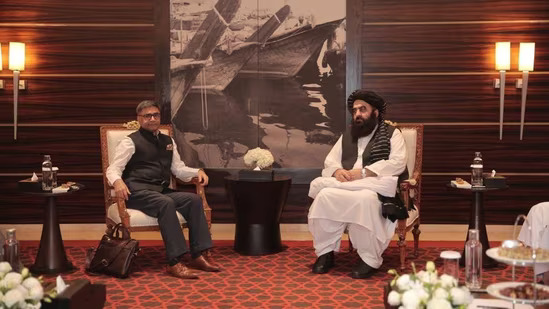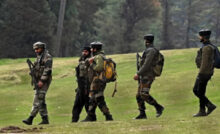India’s foreign secretary meets Taliban minister for first time in Dubai


The meeting was part of the Indian side’s continuing engagement with the Taliban regime in Kabul, which isn’t formally recognised by New Delhi


New Delhi: The Afghan Taliban conveyed it’s “sensitivities to India’s security concerns” as foreign secretary Vikram Misri met the Taliban’s acting foreign minister Amir Khan Muttaqi for the first time in Dubai on WednesdayThe Indian side pledged to provide support to Afghanistan for the health sector and for rehabilitating refugees during the meeting, which was part of the Indian side’s continuing outreach to the Taliban regime in Kabul, which isn’t formally recognised by New Delhi.
India’s engagement with the Taliban leadership has largely been handled by the foreign ministry’s pointperson for Afghanistan, JP Singh, and this was the first officially acknowledged meeting between the foreign secretary and a senior Taliban leader.
“The Afghan side underlined its sensitivities to India’s security concerns,” the external affairs ministry said in a readout on the meeting, without giving details.
People familiar with the matter said on condition of anonymity that India continues to have security concerns related to the presence in Afghanistan of a large number of fighters from Pakistan-based terror groups such as Lashkar-e-Taiba (LeT) and Jaish-e-Mohammed (JeM). The Indian side has in the past urged the Taliban to ensure that Afghan soil is not used by any anti-India elements, the people said
In response to a request from the Afghan side, India will “provide further material support in the first instance to the health sector and for the rehabilitation of refugees”, the readout added.
India’s offer of helping with the rehabilitation of refugees in Afghanistan came against the backdrop of Pakistan’s expulsion of more than 500,000 Afghan refugees.
The readout said the two sides discussed issues related to bilateral ties and regional developments, and agreed to promote the use of Chabahar port in Iran for supporting trade and commercial activities, including for providing humanitarian assistance to Afghanistan.
An Indian state-run firm operates a terminal at Chabahar port, which is emerging as a key trade and trans-shipment hub. India and Iran last year signed a 10-year agreement for Indian operations at the port, which has been used by India in recent years to bypass Pakistan while transporting humanitarian assistance to Afghanistan.
Misri underlined India’s “historic friendship with the Afghan people” and the strong people-to-people contacts between the two countries, and conveyed “India’s readiness to respond to the urgent developmental needs of the Afghan people”, the readout said. The two sides also discussed the strengthening of sports cooperation, especially in cricket.
The two sides assessed ongoing Indian humanitarian assistance programmes, and Muttaqi thanked the Indian leadership for “continuing to engage and support the people of Afghanistan”. In view of the need for development activities, it was decided that India would “consider engaging in development projects in the near future”, in addition to ongoing humanitarian assistance programmes, the readout said.
India’s work on a range of development projects in Afghanistan that were funded through grants and soft loans stopped after the Taliban takeover of Kabul in mid-2021. India also pulled out all its diplomats from Afghanistan at the time, and it re-established a presence in Kabul by sending a “technical team” to the embassy in 2022.
As part of its humanitarian assistance to Afghanistan, India has dispatched several shipments that included 50,000 tonnes of wheat, 300 tonnes of medicines, 27 tonnes of earthquake relief aid, 40,000 litres of pesticides, 100 million polio doses, 1.5 million doses of Covid vaccines, 11,000 units of hygiene kits for a drug de-addiction programme, 500 units of winter clothing and 1.2 tonnes of stationery kits.
The readout said the two sides agreed to remain in touch and continue regular contacts at various levels.
Prior to the meeting between the foreign secretary and the Taliban minister, India’s contacts with the regime in Kabul were largely handled by JP Singh, joint secretary of the Pakistan-Afghanistan-Iran division in the external affairs ministry. In November, Singh had met the Taliban’s acting defence minister Mohammad Yaqoob for the first time. Yaqoob, the son of Taliban founder and late supreme leader Mullah Omar, had not publicly interacted with Indian interlocutors in the past.
The meeting in Dubai came two days after India condemned Pakistan’s recent air strikes in Afghanistan that killed dozens of civilians, and said Islamabad has often sought to blame neighbouring countries for its “own internal failures”. The said the air strikes by Pakistan on December 24 killed at least 46 civilians, including women and children.
Recent Posts
Stampede during festival at Goa temple leaves at least 6 dead, several injured
Goa Lairai Devi temple stampede: Among the injured, at least 10 people remain in critical condition…
Heavy rain, thunderstorms in Delhi bring respite from heat; IMD sounds alert, flight ops hit
Delhi NCR Weather Update | IMD Red Alert: The weather department had said that a fresh…
At least 14 dead in Kolkata hotel fire, SIT formed to probe cause
Kolkata Hotel Fire News: The fire broke out around 7:30 pm at the Rituraj Hotel,…
Pahalgam attack fallout: Pakistan violates ceasefire; India releases names of 14 ‘active terrorists’ in Kashmir | Full list
Indian soldiers inspect the site in the aftermath of an attack in Pahalgam, about 90kms (55…
Pahalgam guide became guardian angel for Chhattisgarh BJP worker: ‘Hugged the children, saved their lives’
When the attack took place on Tuesday, Agrawal (35) said other tourists pulled him to safety,…
Two terrorists killed in encounter in Baramulla’s Uri day after Pahalgam attack
Indian Army said the encounter broke out on Wednesday with approximately two-three terrorists attempting to infiltrate…


